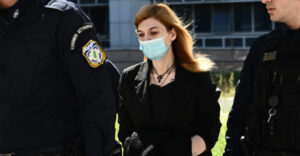“The defendant experienced no grief over the loss of Malena. The only emotion she had after her death was her anxiety about the cause of death that the coroner would record. That was all she was worried about,” said the prosecutor of the Athens Mixed Jury Court today, addressing the court on the guilt or not of Roula Pispirigou for the deaths of her two younger girls.
Without by this time having concluded the guilt or not of the accused mother from Patras, the prosecutor has been refuting frame by frame the defense claims that Roula Pispirigou has developed throughout the trial, denying the accusations that she murdered her daughters Malena and Irida.
According to the prosecutor, however, neither did the doctors delay going to Malena’s room to resuscitate her, nor did the accused mother complain when she lost her child that it was the fault of the doctors at Aglaia Kyriakou, nor did she experience any grief over her death.
The prosecutor, during her thorough examination, left heavy criticisms of the forensic pathologist, Chr. Tsakonas attributed Malena’s death to liver failure, in contrast to her colleagues N. Karakouki and N. Kalogreas, who then ruled that both Malena and Iris died of asphyxiation with obstruction of their airways.
“It’s tragic. A forensic pathologist of the Athens Forensic Service making a hypothetical reasoning? To say that I imagined this as the cause of death, that is what I wrote. But you’re dealing with a 3.5-year-old child. Mrs. Tsakona wrote a conclusion without knowing the image of the child just before she left life, nor the drugs she was taking,” said among other things about this particular forensic doctor, the prosecutor, while referring to Roula Pispirigou noted:“The way of life that the accused followed after Malena’s death is not consistent with mourning. She was having sessions with Daskalakis with a psychologist to resolve problems in her marriage, not for issues related to the psychological support of Georgina who lost her sister.”
Earlier, during her summation, the prosecutor had pointed out that “medical circles” considered the deaths of the three children of the Daskalakis family unexplained and stirred them up, not journalists, as the accused mother said in her apology.
Specifically, referring to the case of the death of Malena, who was only 3.5 years old, the prosecutor cited in detail the history of the child until she was diagnosed with curable, according to doctors, leukemia and admitted to the hospital “Panagiotis and Aglaia Kyriakou” for treatment.“Malena was not placed in the high-risk category, the prosecutor noted, citing the good values in the tests to which the little girl was constantly undergoing. Regarding the chemotherapy that little Malena underwent, the prosecutor noted that the doctors followed a European protocol, one that, she said, is followed all over the world for children who are sick.“No arrhythmia was found in Malena’s heart, the liver was functioning perfectly, she said, among other things.
The prosecutor then spoke about the tests the little girl underwent the day before she passed away. “No mention was made by the parents to the doctors about any pathological condition the child might have been facing, she said, stressing that all of Malena’s tests were normal, even after the administration of chemotherapy. “On April 12, the hepatology tests were excellent. But the child died the next day with a damaged liver.”
On the day of Malena’s death, the prosecutor relied on the testimonies of the doctors who examined her 4.5 hours before her death. “Her clinical condition was excellent, and she was even playing in the playground,” he said. “Suddenly the doctor, Ms. Nikita, sees a distraught Rula Pispirigou going, not running, towards them. She approached them, without shouting, according to the statements, and told them, ‘run, run, the child is blue, the pump is beating’. The nurse and doctor were in the room within seconds. Malena was facing the window but very low on the bed. The doctor found that she was unconscious, pale, and apnoeic and realized that the child had died.” The prosecutor said to then refute the accused’s claims that the doctors were late in going to his room for resuscitation. “The ICU team reached Malena’s room within minutes. The CPR took 45 minutes. The time taken to go to the room is 8 to 10 minutes,” the prosecutor said, citing evidence from the trial. “No dissatisfaction was expressed by the accused at the time about the handling of the doctors and nurses. On the contrary, three hours after the child’s death, she thanked them and gave them Malena’s personal belongings as well,” she noted.
“She was not experiencing grief.”
Still according to the prosecutor, it was not proven by any evidence that the accused was experiencing grief over Malena’s death and that this grief caused a rupture in her marriage with M. Daskalakis, as she had said.“If the accused was experiencing severe grief, as she told us, she would not have expressed a desire to make a trip to Italy a month after Malena’s death,” the prosecutor stressed, and went on to say: “I am not criticising it, I am just quoting it to say that what he told us does not follow. I am the last person to judge the way a parent wants to mourn the loss of their child. However, the lifestyle the defendant led afterward was not consistent with mourning. She and Daskalakis were having sessions with a psychologist to resolve problems in her marriage, not for issues related to psychological support for Georgina, who lost her sister. The defendant experienced no grief. The only emotion she had was her anxiety about the cause of death that the coroner would record for Malena. She was worried about it.”
Still a short time later, the prosecutor pointed out about Roula Pispirigou and the girl’s father, Manos Daskalakis: “For three years the parents had no interest in learning about the case file and the cause of their child’s death, especially the mother who was anxious about the results of the forensic examination. Neither one picked up the phone to find out the cause of their child’s death. At no time did she ever approach a lawyer to seek to file a lawsuit against the doctors for their omissions, which she belatedly relied on,” the prosecutor said, detailing the finding of cenotopic degeneration found in the child’s cells, which was (also) attributed to lack of oxygen.
Chacona and liver failure
The prosecutor then referred at length to Roula Pispirigou‘s communication with the forensic pathologist Christina Tsakonas, questioning her conclusion, in which she attributed the girl’s death to liver failure. “The communication between forensic scientist Tsakonas and the defendant is confirmed by messages sent by the defendant to Daskalaki,” the prosecutor said to point out about the forensic scientist: “We were told here by Ms. Chakona, after five years, that she identified a pale liver. Why did she not record it in her report?”
Why did she not record it in her report?
It should be noted here that subsequently, Ms. Chakona’s colleagues, N. Karakukakis and N. Kalogrias, attributed the girl’s death to asphyxiation. Furthermore, for Ms. Tsakonas, the prosecutor said in her summation: “Is it possible for a forensic pathologist serving in the Athens forensic service to confess that he acted in imagination? “Is it possible for the court to declare that a doctor of the police department can have committed a fictitious crime?” To the accused mother, he said, “only God knows how your child died”. I find that tragic. A coroner making a hypothetical speculation? That is what I thought I wrote. But you’re dealing with a three-and-a-half-year-old child. So he drew up a conclusion without knowing the child’s picture just before he passed away or the medications he was taking. In addition, since it was not possible to document the cause of death, why did she not write in her report “undetermined cause of death” and write liver failure? She did not take a phone call to ask what the child’s clinical picture was, she took it for granted that the liver was damaged due to the toxicity of the chemotherapy. I have to admit that I was not aware that one can die from liver failure suddenly, as with cardiac arrest. It’s new knowledge from Mrs. Chakona. She should have scientifically documented the cause of death. Why didn’t she write down what she said here four years later? That the liver failure was caused by hepatotoxicity?”
The prosecutor continues her deliberations on the circumstances of little Malena’s death and is then expected to develop her recommendation on the death of her younger sister, Irida.
Ask me anything
Explore related questions





